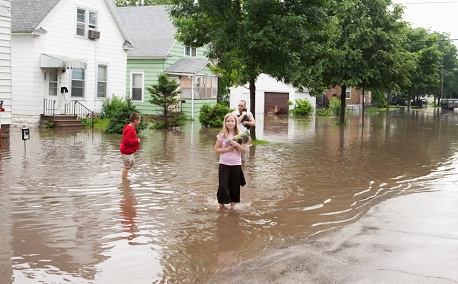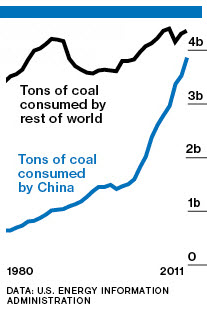Is Global Warming Cooling Off?
When will the President back up his rhetoric? Apr 22 20132012 was the hottest year in U.S. history, warmer than ever for all 48 contiguous states, with records set in nineteen; Australia just concluded its hottest summer ever, preceded by years of drought and wildfires; melting of the Arctic ice cap set
records last year, receding even faster than predicted; a superstorm devastated New York and environs, the biggest of 11 major weather events that brought us a flurry of tornados and droughts of our own; and recently April was the cruelest month in Argentina, with the entire month’s average of 13 inches of rain falling in just 12 hours, flooding the city of La Plata and causing over 50 deaths.
The list of calamities seems to have no end, a consequence, climate scientists believe, of increased climate warming. In fact, NASA’s James Hansen, the first to sound the alarm about global warming before Congress in 1988, says “the five-year mean global temperature has been flat for a decade.”
How’s that again? Temperatures have not been rising?
True. And it’s a fact that has climate scientists like Hansen puzzled. Heat records set around the world, but the overall global temperature has plateaued in recent years. It is as if the new climate extremes of hot and cold have canceled each other out.
turning down the heatThere’s more. Forecasts of global temperature increases are based on computer-generated simulations of natural weather phenomena into which are fed assumptions of mankind’s expanding uses of pollutants. Whereas a doubling of carbon dioxide (CO2) in the atmosphere is thought to account for a 1°C (1.8°F) rise in temperature over the last century and a half, other heat-trapping factors added to mainstream models say that, if we keep to our present course, the global temperature will rise a good deal more. The general consensus is a ruinous median of 3°C or so (5.4°F) by the end of the century and “values higher than 4.5°C cannot be excluded”. That’s been the conclusion of the United Nations Intergovernmental Panel on Climate Change (IPCC) in their 2007 report (its update is expected in September).
But along have come other, more recent studies, relying on different methodologies, that say temperature rises won’t be that severe. The IPCC model is extremely detailed, building its forecasts from an Earth divided into small segments that “do not respond to new temperature readings. They simulate the way the climate works over the long run, without taking account of what current observations are”, explains an article in The Economist.
In contrast, models used for the more more recent studies are not so detailed, treating the Earth as a whole. One of them that does plug in the world’s current temperature readings says the century’s temperature increase may be in the range of only 1.0-3.0°C, with a mean of 1.6°C (2.8°F). That would be good news, were it not still bad news.
skeptic satisfactionWhile scientists grapple with what might be causing the leveling of global temperatures (there are other factors such as clouds, water vapor, volcanic expulsion and soot that influence), deniers of climate change have been quick to latch onto the ten-year temperature-change hiatus as proof that global warming is a hoax. But that willfully ignores the temperature rise of the preceding century and its correlation with the increase of carbon dioxide released into the atmosphere.
It is an undisputed fact of physics that carbon dioxide and methane are greenhouse gases, meaning that they trap heat from being radiated out of the atmosphere. The world is adding that carbon to the atmosphere at a staggering rate — of all that mankind has set loose since 1750, one quarter was released over just the last decade. Carbon dioxide has gone from its pre-industrial level of about 278 parts per million (ppm) to more than the 391 ppm measured last September, with 1.8 ppm now added each year, according to a report commissioned by the World Bank.
Too many forces are at play that will cause the rise in global temperatures to resume. For example, the International Energy Agency said in December that, thanks to China, coal will likely rival oil as the world's largest source of energy within five years, increasing by 1.2 billion metric 
tons a year. China is approaching the point where it will consume as much coal yearly as all other nations combined.
Hansen is certainly undeterred by the counterclaims against warming. The scientist who said that if the Keystone XL pipeline is approved, accelerated Alberta tar sands extraction will be “game over” in the fight against global warming, Hansen recently announced that he is leaving NASA to campaign full time for political and legal action to stem climate change. His was not the only NASA voice. Fellow climate researcher Gavin Schmidt at NASA’s Goddard Institute for Space Studies said in a Science article that on our present course “climate changes to come are going to be larger than anything that human civilization has seen in its entire existence”.
Thousands of scientists concur and even the public gets the picture. Awakened by Hurricane Sandy, 4 of 5 polled in December by the Associated Press and GfK, a German consumer research outfit, were persuaded that climate change will be a serious problem for the United States if nothing is done. That’s an increase from 73% when the question was asked in 2009. A Duke University survey released in February found that 64% strongly or somewhat favor regulating pollution from power plants and factories and requiring utilities to generate more power from “clean” low-carbon sources.
missing: common senseBecause the climate is almost certainly changing, we need to ensure that whatever human contribution might be a factor is minimized. Instead of dividing into factions that imperil the future of humanity, shouldn’t we be guided by a few sensible precepts:
» If the climate is changing without human contribution, and we reduce CO2, that is a win (national security, balance of payments, pollution, energy independence, etc.).
» If the climate is changing with human contribution, and we reduce CO2 and ameliorate it, that is a win (the above list, plus climate).
» If the climate is changing without human contribution, and we do not reduce CO2, we lose major benefits (see the first scenario).
» If the climate is changing with human contribution, and we do not reduce CO2, we have a real disaster on our hands.
Conclusion? Four scenarios with only one of them a disaster and the other three either OK or better.
And yet government allows year after year to go by without action anywhere nearly sufficient to turn down the heat. Congress is of course worse than useless. Bought off by the fossil fuel industries, it acts to block any forward movement with its willful unconcern for the country’s future.
Which leaves the president and the executive branch.
why the delay, mr. president?Right after his election in 2008, President Obama said to a gathering of governors and foreign officials, “Now is the time to confront this challenge once and for all. Delay is no longer an option. Denial is no longer an acceptable response… My presidency will mark a new chapter in America’s leadership on climate change that will strengthen our security and create millions of new jobs in the process”. Then, in his first inaugural we heard him say, “We'll work tirelessly to…roll back the specter of a warming planet”.
No all-embracing tireless effort came of that. He can boast of his signal achievement of nearly doubling the efficiency standards for autos to 54.5 miles per gallon by 2025, which is expected to cut oil consumption by 12 billion barrels as the standard ratchets upward between now and then. But he scuttled the ozone restrictions proposed by his administration's Environmental Protection Agency (EPA) and went no further on other fronts.
Last November in his acceptance speech after re-election he said, “We want our children to live in an America … that isn’t threatened by the destructive power of a warming planet.”
Forgetting Rahm Emanuel’s dictum about never letting a crisis go to waste, he missed the singular opportunity right after Hurricane Sandy to go before the American people with a speech devoted entirely to the need for climate action, an educational speech to rally public support against entrenched interests. He let the moment pass and Sandy Hook Elementary School replaced Sandy, re-directing Obama’s emphasis to gun control.
Yet in January’s second inaugural he said, “We will respond to the threat of climate change, knowing that failure to do so would betray our children and future generations”, raising expectations once again that he would finally make climate legislation a focus of his second term.
No over-arching program so far.
There is much Obama can do entirely on his own authority by executive order and the EPA’s exercise of the Clean Air Act, with which the Supreme Court agreed that carbon dioxide is a pollutant and therefore subject to regulation. Obama could even set a national cap on greenhouse gases by all industry, says the Center for Biological Diversity.
A major step in that direction could come April 13th, when the EPA is due to issue greenhouse gas limits for power plants. The public comment period elicited a record 2.67 million responses, but the power industry is still putting up a fight. After decades of skirting rules requiring them to retrofit plants with pollution devices, after rule relaxations and waivers, especially from the Cheney energy regime, the coal-fired companies are claiming that gas-fired plants have an unfair advantage if a single ruling applies to all, as if the new regulations will come as a surprise.
And yet, Obama continues to speak of his “all of the above” policy for oil and gas and is widely expected to approve the Keystone XL pipeline. So just where does he stand?
Americans seem rather savvy in the matter. Those surveys mentioned earlier also reveal that only 45% think Obama will take major action to fight climate change in his second term. That’s only slightly more than the 41% percent who think he won’t.
Please subscribe if you haven't, or post a comment below about this article, or
click here to go to our front page.

